Female inferiors性别歧视英语作文
性别歧视作文英文作文

性别歧视作文英文作文英文:Gender discrimination is a topic that has been discussed for decades. It refers to the unequal treatment of individuals based on their gender. In many societies, women are often subjected to gender discrimination, which limits their opportunities and affects their quality of life.One example of gender discrimination is the gender pay gap. Women are often paid less than men for doing the same job, even if they have the same qualifications and experience. This is unfair and unjust, as it limits women's economic opportunities and affects their ability to support themselves and their families.Another example is gender-based violence. Women are more likely to be victims of domestic violence, sexual assault, and harassment. This not only affects theirphysical and mental health but also limits their ability to participate fully in society.It is important to address gender discrimination and work towards creating a more equal and just society. This can be done through education and awareness-raising, aswell as implementing policies and laws that promote gender equality.中文:性别歧视是一个被讨论了几十年的话题。
性别歧视英语作文
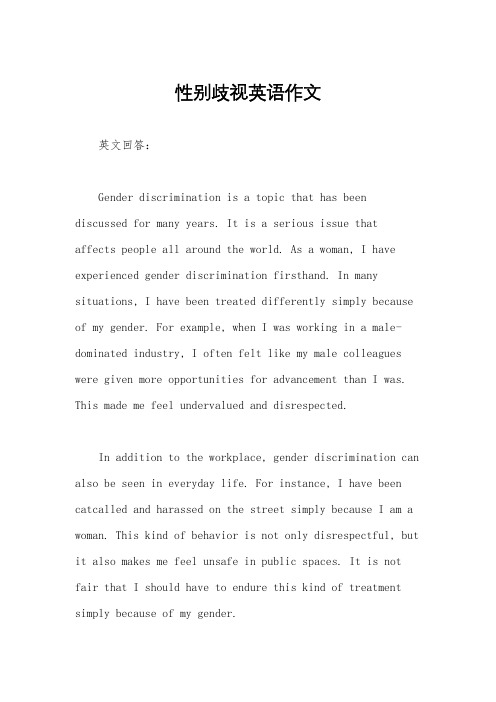
性别歧视英语作文英文回答:Gender discrimination is a topic that has been discussed for many years. It is a serious issue thataffects people all around the world. As a woman, I have experienced gender discrimination firsthand. In many situations, I have been treated differently simply because of my gender. For example, when I was working in a male-dominated industry, I often felt like my male colleagues were given more opportunities for advancement than I was. This made me feel undervalued and disrespected.In addition to the workplace, gender discrimination can also be seen in everyday life. For instance, I have been catcalled and harassed on the street simply because I am a woman. This kind of behavior is not only disrespectful, but it also makes me feel unsafe in public spaces. It is not fair that I should have to endure this kind of treatment simply because of my gender.It is important for society to address and combatgender discrimination. We need to create a world where everyone is treated equally, regardless of their gender. This means providing equal opportunities for men and womenin the workplace, and also educating people about the harmful effects of gender discrimination. Only by working together can we create a more inclusive and respectful society for all.中文回答:性别歧视是一个长期以来被讨论的话题。
性别歧视的英文作文
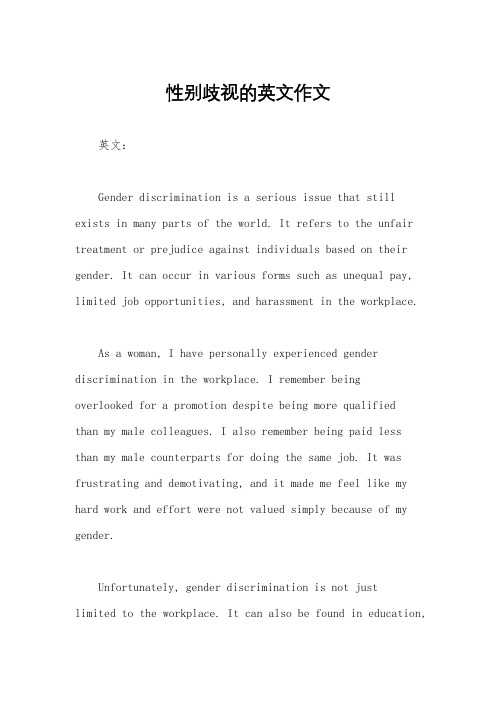
性别歧视的英文作文英文:Gender discrimination is a serious issue that still exists in many parts of the world. It refers to the unfair treatment or prejudice against individuals based on their gender. It can occur in various forms such as unequal pay, limited job opportunities, and harassment in the workplace.As a woman, I have personally experienced gender discrimination in the workplace. I remember beingoverlooked for a promotion despite being more qualifiedthan my male colleagues. I also remember being paid less than my male counterparts for doing the same job. It was frustrating and demotivating, and it made me feel like my hard work and effort were not valued simply because of my gender.Unfortunately, gender discrimination is not justlimited to the workplace. It can also be found in education,healthcare, and even in our everyday interactions with others. For example, women are often expected to conform to traditional gender roles and stereotypes, such as being the primary caregiver for children and taking care of the household. Men, on the other hand, are expected to be the breadwinners and to exhibit traits such as strength and dominance.It is important to recognize that gender discrimination is not just a women's issue. Men can also be victims of gender discrimination, particularly when it comes to issues such as paternity leave and childcare responsibilities. By working together and challenging gender stereotypes and biases, we can create a more equal and just society.中文:性别歧视是一个严重的问题,仍然存在于世界上许多地方。
性别歧视看法的英语作文

性别歧视看法的英语作文Gender discrimination is a prevalent issue that has plagued societies worldwide for centuries. It is a complex and multifaceted problem that manifests in various forms, from unequal treatment in the workplace to societal biases and stereotypes. Despite the significant progress made in recent decades towards gender equality, there is still much work to be done to address this persistent challenge.One of the primary manifestations of gender discrimination is the pay gap between men and women. Even in developed countries with progressive policies, women on average earn less than their male counterparts, even when performing the same job with the same qualifications. This disparity is often attributed to a combination of factors, including conscious and unconscious biases, the undervaluation of traditionally "feminine" professions, and the disproportionate burden of domestic and caregiving responsibilities that often fall on women.The issue of gender discrimination in the workplace extends beyond just the pay gap. Women often face barriers to career advancement,with fewer opportunities for promotions and leadership positions compared to their male colleagues. This can be due to a variety of reasons, such as the perpetuation of gender stereotypes, the lack of mentorship and support networks, and the challenges of balancing work and family responsibilities.Moreover, gender discrimination can manifest in more subtle and insidious ways, such as the prevalence of sexual harassment and the normalization of sexist attitudes and behaviors in the workplace. Women often face unwanted advances, inappropriate comments, and even physical harassment, which can create a hostile and uncomfortable work environment. These experiences can have significant psychological and emotional consequences, leading to decreased job satisfaction, reduced productivity, and even the decision to leave the workforce altogether.Beyond the workplace, gender discrimination is also deeply rooted in societal norms and cultural beliefs. In many parts of the world, women are still viewed as inferior to men, with limited access to education, healthcare, and other essential resources. This can lead to a cycle of poverty and marginalization, further exacerbating the challenges faced by women.The impact of gender discrimination extends far beyond the individual level. It has far-reaching consequences for families,communities, and entire societies. When women are denied access to education and economic opportunities, it not only limits their personal growth and development but also deprives the broader community of their valuable contributions and perspectives.Moreover, gender discrimination has a profound impact on the health and well-being of women. Women who experience discrimination are more likely to suffer from mental health issues, such as depression and anxiety, as well as physical health problems, including cardiovascular disease and reproductive health issues.Addressing gender discrimination requires a multifaceted approach that involves tackling the root causes of the problem. This includes challenging and changing societal attitudes and beliefs, implementing robust legal and policy frameworks to protect the rights of women, and fostering a culture of inclusivity and respect in all spheres of life.Governments, businesses, and civil society organizations all have a crucial role to play in this effort. Policymakers must enact laws and regulations that promote gender equality, such as mandating equal pay, enforcing anti-discrimination policies, and providing support for working mothers. Businesses can also play a significant role by implementing inclusive hiring practices, providing equal opportunities for career advancement, and fostering a workplaceculture that is free from discrimination and harassment.At the individual level, everyone has a responsibility to examine their own biases and prejudices, and to actively work towards dismantling gender stereotypes and promoting a more equitable society. This can involve educating oneself on the issue, speaking out against discriminatory behavior, and actively supporting and empowering women in their personal and professional endeavors.In conclusion, gender discrimination is a complex and multifaceted issue that requires a concerted effort from all sectors of society to address. By challenging societal norms, implementing robust policies, and fostering a culture of inclusivity and respect, we can work towards a future where gender is no longer a barrier to opportunity, and where all individuals are able to reach their full potential, regardless of their gender identity. This is not only a moral imperative but also a crucial step towards building a more just, equitable, and prosperous world for all.。
有关性别歧视的英语作文

有关性别歧视的英语作文Gender discrimination is a prevalent issue that still exists in many parts of the world. It is the unfair treatment or prejudice against individuals based on their gender. This discrimination can occur in various aspects of life,including education, employment, and social interactions.One of the most common forms of gender discrimination is seen in the workforce. Women are often paid less than men for the same job and are given fewer opportunities for career advancement. This inequality not only affects the financial well-being of women but also their sense of self-worth and value in society.In education, gender discrimination can be observed in the way subjects are taught and the expectations placed on students based on their gender. Girls are sometimes discouraged from pursuing subjects like math and science,while boys may face ridicule for taking an interest in traditionally "feminine" subjects. These biases can limit the potential of individuals and perpetuate harmful stereotypes.Furthermore, gender discrimination can also manifest in social interactions and cultural norms. Women are often expected to adhere to traditional gender roles and face scrutiny for deviating from these expectations. This can lead to ostracization and marginalization of individuals who do not conform to societal norms.It is essential to address gender discrimination through education, awareness, and policy changes. By promoting gender equality and challenging harmful stereotypes, we can create a more inclusive and fair society for all individuals, regardless of their gender. Ultimately, everyone should be given equal opportunities and treated with respect and dignity, regardless of their gender. Gender discrimination has no place in a modern and progressive society.。
性别歧视的英语作文
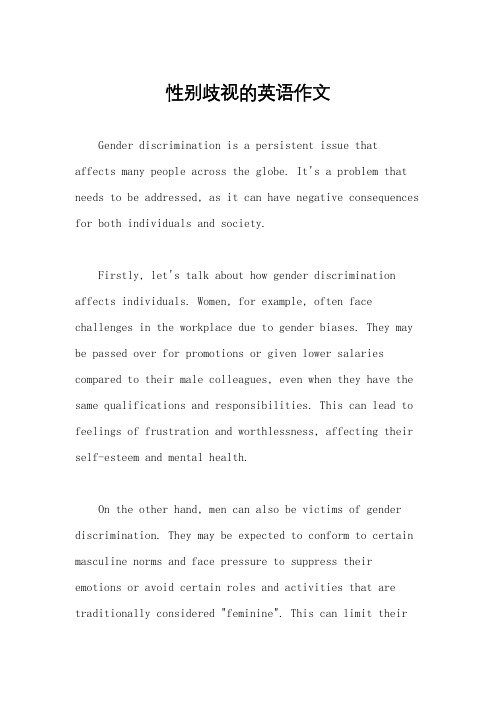
性别歧视的英语作文Gender discrimination is a persistent issue thataffects many people across the globe. It's a problem that needs to be addressed, as it can have negative consequences for both individuals and society.Firstly, let's talk about how gender discrimination affects individuals. Women, for example, often face challenges in the workplace due to gender biases. They may be passed over for promotions or given lower salaries compared to their male colleagues, even when they have the same qualifications and responsibilities. This can lead to feelings of frustration and worthlessness, affecting their self-esteem and mental health.On the other hand, men can also be victims of gender discrimination. They may be expected to conform to certain masculine norms and face pressure to suppress their emotions or avoid certain roles and activities that are traditionally considered "feminine". This can limit theirpersonal growth and lead to feelings of isolation and stress.Gender discrimination also has broader societal impacts. It can perpetuate negative stereotypes and attitudes about different genders, limiting people's potential and opportunities. It can also contribute to social inequality and injustice,。
生活中的性别歧视英语作文
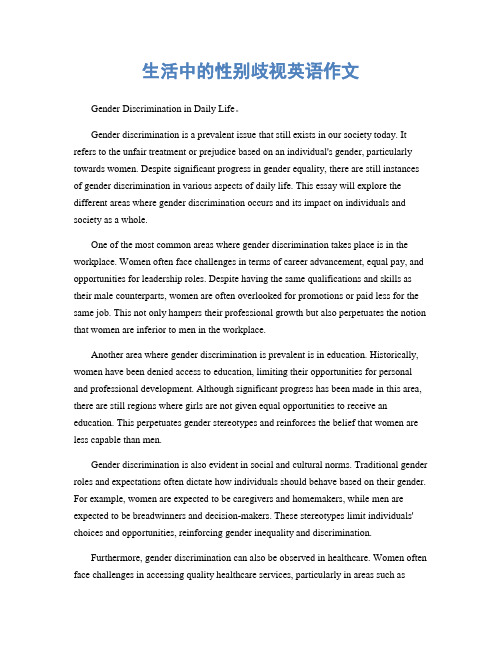
生活中的性别歧视英语作文Gender Discrimination in Daily Life。
Gender discrimination is a prevalent issue that still exists in our society today. It refers to the unfair treatment or prejudice based on an individual's gender, particularly towards women. Despite significant progress in gender equality, there are still instances of gender discrimination in various aspects of daily life. This essay will explore the different areas where gender discrimination occurs and its impact on individuals and society as a whole.One of the most common areas where gender discrimination takes place is in the workplace. Women often face challenges in terms of career advancement, equal pay, and opportunities for leadership roles. Despite having the same qualifications and skills as their male counterparts, women are often overlooked for promotions or paid less for the same job. This not only hampers their professional growth but also perpetuates the notion that women are inferior to men in the workplace.Another area where gender discrimination is prevalent is in education. Historically, women have been denied access to education, limiting their opportunities for personal and professional development. Although significant progress has been made in this area, there are still regions where girls are not given equal opportunities to receive an education. This perpetuates gender stereotypes and reinforces the belief that women are less capable than men.Gender discrimination is also evident in social and cultural norms. Traditional gender roles and expectations often dictate how individuals should behave based on their gender. For example, women are expected to be caregivers and homemakers, while men are expected to be breadwinners and decision-makers. These stereotypes limit individuals' choices and opportunities, reinforcing gender inequality and discrimination.Furthermore, gender discrimination can also be observed in healthcare. Women often face challenges in accessing quality healthcare services, particularly in areas such asreproductive health and maternal care. This not only affects their physical well-being but also perpetuates gender inequality in society.The impact of gender discrimination on individuals and society is far-reaching. It hampers the overall development and progress of a society by limiting the potential of half of its population. When women are denied equal opportunities and treated unfairly, it results in a loss of talent and potential that could contribute to economic growth and social development. Moreover, gender discrimination perpetuates harmful stereotypes and biases, which further divide and marginalize different genders.To address gender discrimination, it is essential to raise awareness and promote gender equality in all areas of life. Governments, organizations, and individuals must work together to eliminate gender stereotypes, provide equal opportunities, and ensure fair treatment for all genders. Education plays a crucial role in challenging traditional gender norms and fostering a more inclusive and equal society. By empowering women and girls through education and promoting gender equality, we can create a future where gender discrimination is a thing of the past.In conclusion, gender discrimination remains a significant issue in our daily lives. It affects women in various aspects, including the workplace, education, social norms, and healthcare. The impact of gender discrimination is detrimental to individuals and society as a whole. To combat this issue, it is crucial to promote awareness, challenge stereotypes, and provide equal opportunities for all genders. Only through collective efforts can we create a society that is truly equal and free from gender discrimination.。
关于性别歧视的英语作文及翻译(五篇材料)
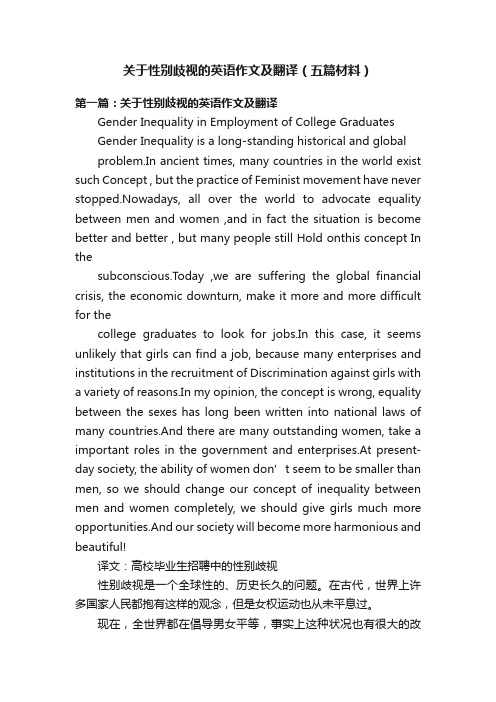
关于性别歧视的英语作文及翻译(五篇材料)第一篇:关于性别歧视的英语作文及翻译Gender Inequality in Employment of College GraduatesGender Inequality is a long-standing historical and globalproblem.In ancient times, many countries in the world exist such Concept , but the practice of Feminist movement have never stopped.Nowadays, all over the world to advocate equality between men and women ,and in fact the situation is become better and better , but many people still Hold onthis concept In thesubconscious.T oday ,we are suffering the global financial crisis, the economic downturn, make it more and more difficult for thecollege graduates to look for jobs.In this case, it seems unlikely that girls can find a job, because many enterprises and institutions in the recruitment of Discrimination against girls with a variety of reasons.In my opinion, the concept is wrong, equality between the sexes has long been written into national laws of many countries.And there are many outstanding women, take a important roles in the government and enterprises.At present-day society, the ability of women don’t seem to be smaller than men, so we should change our concept of inequality between men and women completely, we should give girls much more opportunities.And our society will become more harmonious and beautiful!译文:高校毕业生招聘中的性别歧视性别歧视是一个全球性的、历史长久的问题。
性别歧视英语作文
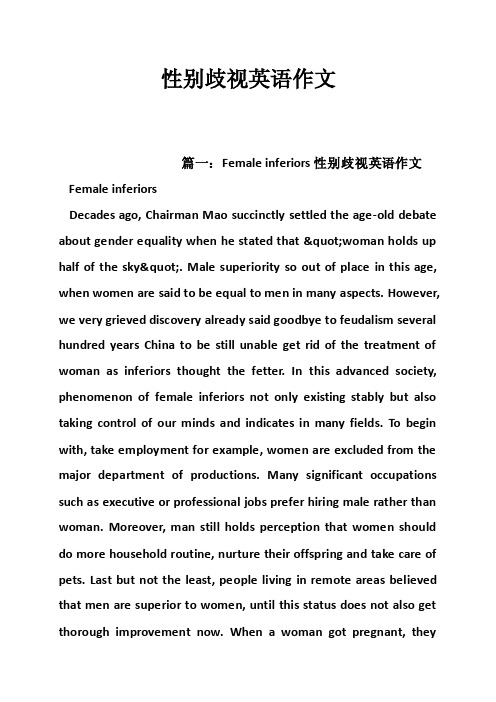
性别歧视英语作文篇一:Female inferiors性别歧视英语作文Female inferiorsDecades ago, Chairman Mao succinctly settled the age-old debate about gender equality when he stated that "woman holds up half of the sky". Male superiority so out of place in this age, when women are said to be equal to men in many aspects. However, we very grieved discovery already said goodbye to feudalism several hundred years China to be still unable get rid of the treatment of woman as inferiors thought the fetter. In this advanced society, phenomenon of female inferiors not only existing stably but also taking control of our minds and indicates in many fields. To begin with, take employment for example, women are excluded from the major department of productions. Many significant occupations such as executive or professional jobs prefer hiring male rather than woman. Moreover, man still holds perception that women should do more household routine, nurture their offspring and take care of pets. Last but not the least, people living in remote areas believed that men are superior to women, until this status does not also get thorough improvement now. When a woman got pregnant, theywere begging for a son instead of a daughter.To prevent these troublesome already mentioned from happen again, we should create feministic atmosphere, promote gender equality and ask man to do household chores, because in a family where roles of men and women are not sharply separated and where many household tasks areshared to a certain extent, notions of male superiority are hard to maintain.篇二:英文性别歧视事例Girls: Household ServantsWhen a boy is born in most developing countries, friends and relatives exclaim congratulations. A son means insurance. He will inherit his father's property and get a job to help support the family. When a girl is born, the reaction is very different. Some women weep when they find out their baby is a girlbecause, to them, a daughter is just another expense. Her place is in the home, not in the world of men. In some parts of India, it's traditional to greet a family with a newborn girl by saying, "The servant of your household has been born."A girl can't help but feel inferior when everything around her tells her that she is worth less than a boy. Her identity is forged as soon as her family and society limit her opportunities and declareher to be second-rate.A combination of extreme poverty and deep biases against women creates a remorseless cycle of discrimination that keeps girls in developing countries from living up to their full potential. It also leaves them vulnerable to severe physical and emotional abuse. These "servants of the householdcome to accept that life will never be any different.NeglectThe developing world is full of poverty-stricken families who see their daughters as an economic predicament困境. That attitude has resulted in the widespread neglect of baby girls in Africa, Asia, and South America. In many communities, it's a regular practice to breastfeed girls for a shorter time than boys so that women can try to get pregnant again with a boy as soon as possible. As a result, girls miss out on life-giving nutrition during a crucial window of their development, which stunts their growth and weakens their resistance to disease.Statistics show that the neglect continues as they grow up. Young girls receive less food, healthcare and fewer vaccinations overall than boys. Not much changes as they become women. Tradition calls for women to eat last, often reduced to picking over the leftovers from the men and boys.AbuseEven after infancy, the threat of physical harm follows girls throughout their lives. Women in every society are vulnerable to abuse. But the threat is more severe for girls and women who live in societies where women's rights mean practically nothing. Mothers who lack their own rights have little protection to offer their daughters, much less themselves, from male relatives and other authority figures. The frequency of rape and violent attacks against women in the developing world is alarming. Forty-five percent of Ethiopian women say that they have been assaulted in their lifetimes. In 1998, 48 percent ofPalestinian women admitted to being abused by an intimate partner within the past year.In some cultures, the physical and psychological trauma of rape is compounded by an additional stigma. In cultures that maintain strict sexual codes for women, if a woman steps out of bounds—by choosing her own husband, flirting in public, or seeking divorce from an abusive partner—she has brought dishonor to her family and must be disciplined. Often, discipline means execution. Families commit "honor killingsto salvage their reputation tainted by disobedient women.Appallingly, this "disobedienceincludes rape. In 1999, a16-year-old mentally handicapped girl in Pakistan who had been raped was brought before her tribe's judicial counsel. Although she was the victim and her attacker had been arrested, the counsel decided she had brought shame to the tribe and ordered her public execution. This case, which received a lot of publicity at the time, is not unusual. Three women fall victim to honor killings in Pakistan every day—including victims of rape. In areas of Asia, the Middle East, and even Europe, all responsibility for sexual misconduct falls, by default, to women. How to Help You can help pull down the barriers that keep girls from attending school and begin to bring change for women in developing countries. The most direct way is by easing the financial need that forces families to take their children out of school in the first place.Dozens of international organizations are working to improve the livelihood of impoverished people. By building infrastructure and providing aid, vocational training, and education programs, they give families in developing countries resources to create healthy and stable lives. That takes the burden of mere survival off young women and gives them the time to get an education. With practical help and encouragement, girls are more likely to eoll and stay inschool.encouraging all international organizations to come up with strategies for girls' education as part of their initial development plans. It has also started a movement to monitor school materials, facilities, and teachers to ensure that girls get a quality education that promotes appropriate perceptions of women, and that female students are given the same privileges as male students. other reputable organizations need now are the resources to fund their efforts.You can help begin to change the lives of women around the world by making a financial gift or raising awareness about girls in the developing world who want to help raise awareness of the issues tha impact children. You can The need is clear, and though the obstacles to ending gender discrimination are high, they are not insurmountable.Educatedwomen are essential to ending gender bias, starting by reducing the poverty that makes discrimination even worse in the developing world. The most basic skills in literacy and arithmetic open up opportunities for better-paying jobs for women. Uneducated women in rural areas of Zambia, for instance, are twice as likely to live in poverty as those who have had eight or more years ofeducation. The longer a girl is able to stay in school, the greater her chances to pursue worthwhile employment, higher education, and a life without the hazards of extreme poverty.Women who have had some schooling are more likely to get married later, survive childbirth, have fewer and healthier children, and make sure their own children complete school. They also understand hygiene and nutrition better and are more likely to prevent disease by visiting health care facilities. The UN estimates that for every year a woman spends in primary school, the risk of her child dying prematurely is reduced by 8 percent.Girls' education also means comprehensive change for a society. As women get the opportunity to go to school and obtain higher-level jobs, they gain status intheir communities. Status translates into the power to influence their families and societies.Even bigger changes become possible as girls' education becomes the cultural norm. Women can't defend themselves against physical and sexual abuse until they have the authority to speak against it without fear. Knowledge gives that authority. Women who have been educated are half as likely to undergo harmful cultural practices such as female genital mutilation (FGM) and four times as likely to protect their daughters from it. TheGlobal Campaign for Education also states that a primary education defends women against HIV/AIDS infection—disproportionately high for women in developing countries—by giving "the most marginalized groups in society—notably young women—the status and confidence needed to act on information and refuse unsafe sex."篇三:关于女性歧视的英语演讲Working treatmentCompanies tend to employ males when employers got the same masters degree.Unequal male-female eollment rates are still exist.When the industries and positions doing this,Universities are no exception.From 2000 to 2010,female students represented more percent of top scores in college entrance exams,but some universities continue to maintain a double standard of favoring females.Assignment distrubution in familyIn China,it has long been a traditional concept that a woman without talent is called virtuous.Males are asked to go to work and wives should worship them and depend on them.although marriage is equally important for both men and women,it is the women who seem to get saddled with the weight of responsibility for adopt children and doing housework. social statusIn daily life, we always equate a woman’s success with the marriage as if that’s all there is to life.These culture expectations and assumptions run deep- so deep that we don’t even notice the built-in sexism that separate women and men.What’s more,women in high politic power are less than man.Still in today,people unconsciously emphasis candidates gender when encounter females’name.Language usingBoth in English and Chinese,language also hind some kinds of discrimination.”male”and “female”,using man to include the human beings,and so on.Besides,maybe high heel shoes can be another term of please their husband or the。
性别歧视的原因英语作文
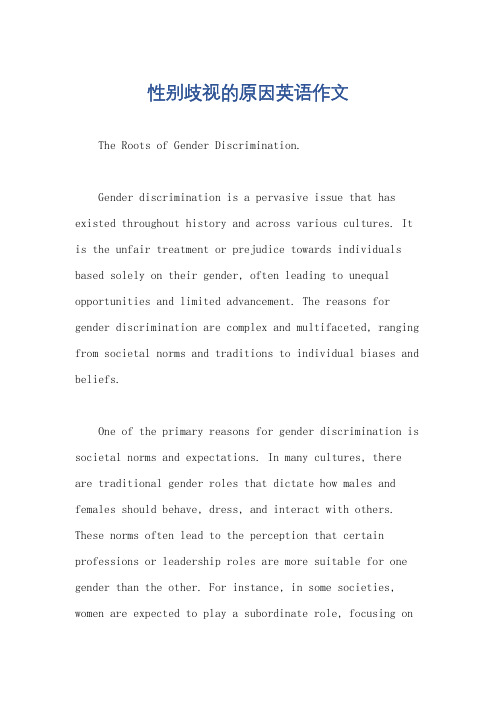
性别歧视的原因英语作文The Roots of Gender Discrimination.Gender discrimination is a pervasive issue that has existed throughout history and across various cultures. It is the unfair treatment or prejudice towards individuals based solely on their gender, often leading to unequal opportunities and limited advancement. The reasons for gender discrimination are complex and multifaceted, ranging from societal norms and traditions to individual biases and beliefs.One of the primary reasons for gender discrimination is societal norms and expectations. In many cultures, there are traditional gender roles that dictate how males and females should behave, dress, and interact with others. These norms often lead to the perception that certain professions or leadership roles are more suitable for one gender than the other. For instance, in some societies, women are expected to play a subordinate role, focusing ondomestic duties and childcare, while men are encouraged to pursue careers in fields like business, politics, or science. Such norms can create barriers for women seekingto enter these traditionally male-dominated domains.Another factor contributing to gender discrimination is the lack of representation and visibility. In many fields, women remain underrepresented, which can lead to a lack of role models and mentors for younger girls. The absence of female leaders and successful women in visible positionscan perpetuate the stereotype that certain professions are not suitable for women. This lack of representation canalso influence hiring decisions and promotional opportunities, leading to a vicious cycle of discrimination.Individual biases and beliefs also play a significant role in gender discrimination. Unconscious biases, such as gender schemas or the tendency to associate certainqualities or abilities with a particular gender, can influence people's perceptions and treatment of others. These biases can lead to unfair assessments, treatment, and opportunities for individuals based solely on their gender.For example, women may be assumed to be less competent or aggressive than men, limiting their chances for promotion or leadership roles.Additionally, gender discrimination can be influenced by economic factors. In some regions, women's economic contributions are undervalued, leading to lower wages and fewer job opportunities. This can create a situation where women are financially dependent on men, further limiting their autonomy and ability to make choices. Such economic disparities can also contribute to women's exclusion from decision-making processes and political representation.Furthermore, gender discrimination often intersects with other forms of discrimination, such as racial or ethnic discrimination. Women from minority groups may face additional barriers and discrimination based on their gender and racial identity. This intersectionality of discrimination can make it more difficult for these women to access equal opportunities and resources.In conclusion, gender discrimination is a complex issuethat arises from a myriad of societal, cultural, and individual factors. To address this issue, it is crucial to identify and challenge the norms, biases, and economic factors that perpetuate discrimination. Promoting gender equality, inclusivity, and representation are essential steps towards creating a more equitable society where everyone can achieve their full potential regardless of gender.。
关于性别歧视的英语作文
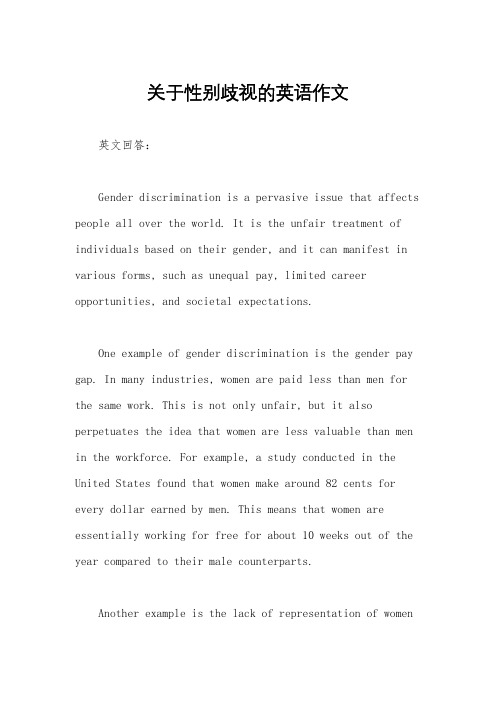
关于性别歧视的英语作文英文回答:Gender discrimination is a pervasive issue that affects people all over the world. It is the unfair treatment of individuals based on their gender, and it can manifest in various forms, such as unequal pay, limited career opportunities, and societal expectations.One example of gender discrimination is the gender pay gap. In many industries, women are paid less than men for the same work. This is not only unfair, but it also perpetuates the idea that women are less valuable than men in the workforce. For example, a study conducted in the United States found that women make around 82 cents for every dollar earned by men. This means that women are essentially working for free for about 10 weeks out of the year compared to their male counterparts.Another example is the lack of representation of womenin leadership positions. In many companies and organizations, men are disproportionately represented intop-level positions, while women are often overlooked for these opportunities. This sends a message that women arenot as capable or deserving of leadership roles as men, which is simply not true. This is often referred to as the "glass ceiling," where women can see the top, but they are unable to break through due to discriminatory practices and attitudes.中文回答:性别歧视是一个普遍存在的问题,影响着世界各地的人们。
性别歧视的原因英语作文

性别歧视的原因英语作文英文回答:Gender discrimination is a complex issue that has been prevalent throughout history. It stems from a multitude of factors, including:1. Socio-cultural Norms:Traditional societal roles and expectations often perpetuate gender inequalities. Women are frequently relegated to domestic roles, while men are expected to be breadwinners. This disparity creates a power imbalance and reinforces stereotypes about gender capabilities.2. Historical Prejudice:Historical attitudes towards women have played a significant role in shaping gender discrimination. Many cultures have viewed women as inferior to men, leading tolaws and policies that restricted their rights and opportunities. This legacy of inequality has carried over into modern-day society.3. Unconscious Bias:Unconscious biases are implicit assumptions or beliefs that can influence our thoughts, feelings, and behaviors towards people from different genders. These biases can lead to discrimination without the individual being consciously aware of it.4. Economic Disparities:Gender pay gaps and occupational segregation contribute to economic inequalities between men and women. Women often earn less than men for the same work and are underrepresented in high-paying fields. This economic imbalance reinforces gender discrimination.5. Patriarchal Systems:Patriarchal societies prioritize the dominance of men over women. This system can manifest in various forms, such as male-centric decision-making, unequal access to resources, and violence against women.6. Lack of Representation:The underrepresentation of women in positions of power and influence perpetuates gender discrimination. When women are not present in leadership roles, their voices and experiences are often marginalized.7. Educational Barriers:Access to education is crucial for empowering women. However, girls in many parts of the world face barriers to education, such as cultural norms, lack of financial support, and gender-based violence. These barriers limit their opportunities and contribute to gender inequality.中文回答:性别歧视的原因。
就业中性别不平等的原因英语作文
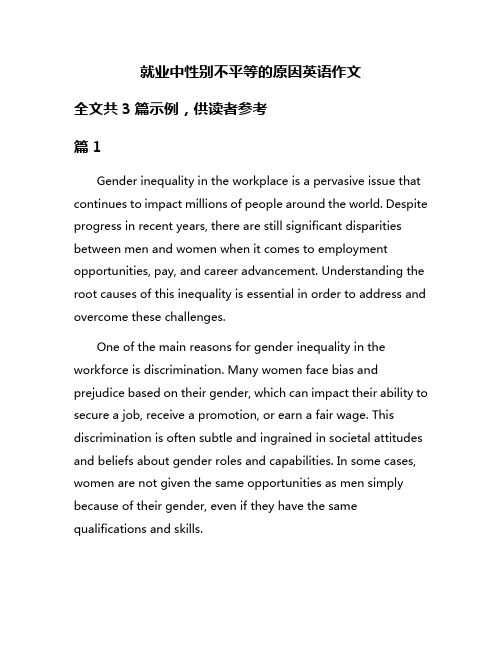
就业中性别不平等的原因英语作文全文共3篇示例,供读者参考篇1Gender inequality in the workplace is a pervasive issue that continues to impact millions of people around the world. Despite progress in recent years, there are still significant disparities between men and women when it comes to employment opportunities, pay, and career advancement. Understanding the root causes of this inequality is essential in order to address and overcome these challenges.One of the main reasons for gender inequality in the workforce is discrimination. Many women face bias and prejudice based on their gender, which can impact their ability to secure a job, receive a promotion, or earn a fair wage. This discrimination is often subtle and ingrained in societal attitudes and beliefs about gender roles and capabilities. In some cases, women are not given the same opportunities as men simply because of their gender, even if they have the same qualifications and skills.Another contributing factor to gender inequality in the workplace is the lack of family-friendly policies and support for working parents. Women are often expected to take on the majority of caregiving responsibilities for children and elderly family members, which can limit their ability to work full-time or pursue higher-paying positions. Without access to affordable childcare, paid parental leave, and flexible work schedules, many women are forced to choose between their careers and their family responsibilities.Additionally, the gender pay gap continues to be a significant issue that perpetuates inequality in the workforce. On average, women earn less than men for the same work, with women of color and women with disabilities facing even larger disparities. This gap can be attributed to a variety of factors, including occupational segregation, lack of negotiation skills, and unconscious bias in performance evaluations and promotion decisions.Social norms and expectations also play a role in perpetuating gender inequality in the workplace. In many cultures, women are still seen as the primary caregivers and homemakers, while men are expected to be the breadwinners. These traditional gender roles can influence hiring practices,promotions, and overall workplace dynamics, creating barriers for women who do not fit into these narrow stereotypes.In order to address gender inequality in the workplace, it is essential to implement policies and practices that promote diversity, equity, and inclusion. Companies can take steps to ensure pay equity, provide mentorship and leadership development opportunities for women, and create a supportive work environment that values and respects all employees regardless of gender. Additionally, governments can enact legislation that protects against gender discrimination and promotes family-friendly policies that support working parents.Ultimately, overcoming gender inequality in the workplace requires a collective effort from individuals, organizations, and governments to challenge outdated beliefs and practices that perpetuate discrimination and bias. By working together to create a more inclusive and equitable workforce, we can help to ensure that all people have the opportunity to succeed and thrive in their careers, regardless of gender.篇2Gender inequality in the workplace is a pressing issue that continues to persist despite efforts towards gender equality inmodern society. While significant progress has been made in recent years, statistics still show that women are often paid less than men, face greater barriers to career advancement, and are more likely to experience discrimination in the workplace. There are several factors that contribute to gender inequality in employment, including gender stereotypes, lack of representation in leadership positions, and unconscious bias.One of the main reasons for gender inequality in the workplace is the existence of gender stereotypes that dictate what roles and responsibilities are suitable for men and women. These stereotypes are deeply ingrained in society and often influence hiring decisions, promotions, and pay rates. For example, women are often seen as nurturing and caring, which can lead to them being stereotyped into lower-paying and less prestigious roles such as nursing or teaching. On the other hand, men are often viewed as assertive and ambitious, which can lead to them being favored for leadership positions andhigher-paying jobs.Another reason for gender inequality in employment is the lack of representation of women in leadership positions. Despite the fact that women make up a significant portion of the workforce, they are still vastly underrepresented in topmanagement and executive roles. This lack of representation perpetuates the idea that women are less capable or less suited for leadership positions, which in turn hinders their ability to advance in their careers. Additionally, the absence of female role models in leadership positions can discourage women from pursuing career advancement and further perpetuate gender inequality.Unconscious bias also plays a significant role in perpetuating gender inequality in the workplace. Unconscious bias refers to the attitudes and stereotypes that affect our understanding, actions, and decisions in an unconscious manner. This bias can manifest in hiring practices, performance evaluations, and opportunities for advancement. For example, a manager may unconsciously favor male employees for promotions or pay raises, even if female employees are equally qualified or more qualified for the position. This unconscious bias can create a hostile work environment for women and contribute to their underrepresentation in leadership positions.In conclusion, gender inequality in the workplace is a complex issue that is influenced by a variety of factors, including gender stereotypes, lack of representation in leadership positions, and unconscious bias. Addressing these issuesrequires a concerted effort from both organizations and individuals to challenge and change existing attitudes and practices that perpetuate gender inequality. By promoting diversity, inclusion, and equal opportunities for all employees, we can work towards creating a more equitable and inclusive workplace for everyone.篇3Gender inequality in the workplace is a pressing issue that continues to persist in society today. Despite advancements in gender equality over the years, women still face barriers and challenges in the workforce that inhibit their ability to achieve the same level of success as men. There are several reasons why gender inequality exists in the workplace, including cultural norms and stereotypes, discrimination, lack of support for working mothers, and unequal access to opportunities for advancement.One of the main reasons for gender inequality in the workplace is the perpetuation of cultural norms and stereotypes that dictate traditional gender roles. Society has long held the belief that men are the primary breadwinners, while women are expected to prioritize their family responsibilities over their careers. This mindset leads to the marginalization of women inthe workforce, as they are often seen as less competent or committed compared to their male counterparts. The reinforcement of these stereotypes through media, education, and social interactions further contributes to the unequal treatment of women in the workplace.Discrimination based on gender is another significant factor that results in inequality in the workplace. Women often face bias and prejudice in hiring, promotion, and salary decisions, which can limit their professional opportunities and hinder their career progression. Studies have shown that women are frequently paid less than men for the same work and are underrepresented in leadership positions across various industries. This discrimination not only perpetuates gender inequality but also creates a hostile work environment for women, making it difficult for them to thrive and succeed in their careers.Furthermore, the lack of support for working mothers is a major barrier that contributes to gender inequality in the workplace. Women who choose to have children often face challenges balancing their family responsibilities with their careers, as they are expected to juggle childcare, household duties, and professional obligations simultaneously. Inadequatematernity leave policies, limited access to affordable childcare, and societal expectations of mothers to prioritize their families over their careers all exacerbate the difficulties that working mothers face in advancing in their professions. This lack of support for working mothers not only hinders their own career development but also perpetuates the gender pay gap and limits women's overall economic empowerment.Additionally, unequal access to opportunities for advancement is a key factor that perpetuates gender inequality in the workplace. Women are often overlooked for promotions, leadership roles, and high-profile projects due to biases and stereotypes that suggest they are not as capable or competent as men. This lack of recognition and support for women's talents and potential inhibits their professional growth and limits their ability to reach their full career potential. Furthermore, the prevalence of male-dominated networks and industries creates barriers for women to access the same opportunities for advancement as their male counterparts, further perpetuating the gender gap in the workforce.In conclusion, gender inequality in the workplace is a complex issue that is rooted in cultural norms, discrimination, lack of support for working mothers, and unequal access toopportunities for advancement. By addressing these systemic barriers and advocating for gender equality in the workforce, society can work towards creating a more inclusive and equitable environment where all individuals have the opportunity to succeed and thrive in their careers, regardless of their gender. It is essential for organizations and policymakers to prioritize gender equality initiatives and create a more level playing field for women in the workforce, as this not only benefits women individually but also contributes to the overall economic growth and prosperity of society as a whole.。
性别歧视作文英文作文
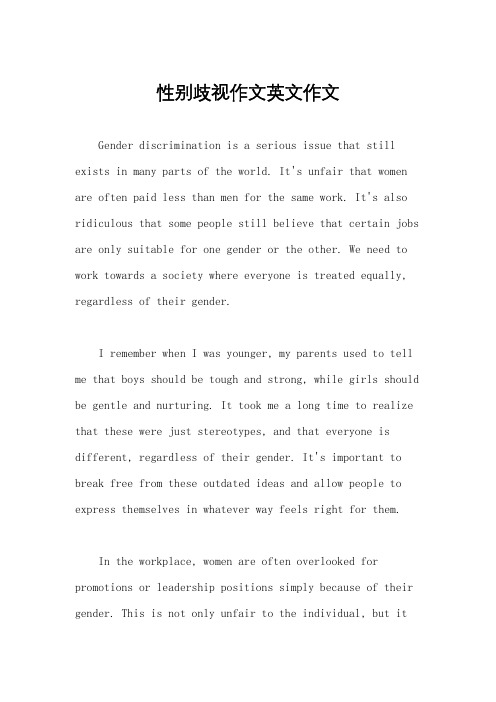
性别歧视作文英文作文Gender discrimination is a serious issue that still exists in many parts of the world. It's unfair that women are often paid less than men for the same work. It's also ridiculous that some people still believe that certain jobs are only suitable for one gender or the other. We need to work towards a society where everyone is treated equally, regardless of their gender.I remember when I was younger, my parents used to tell me that boys should be tough and strong, while girls should be gentle and nurturing. It took me a long time to realize that these were just stereotypes, and that everyone is different, regardless of their gender. It's important to break free from these outdated ideas and allow people to express themselves in whatever way feels right for them.In the workplace, women are often overlooked for promotions or leadership positions simply because of their gender. This is not only unfair to the individual, but italso deprives companies of valuable talent and diverse perspectives. It's time for employers to recognize the value that women bring to the table and give them the same opportunities for career advancement as men.Gender discrimination doesn't just affect women – men can also be victims of unfair treatment based on their gender. For example, men who choose to stay at home and take care of their children may face ridicule and judgment from others who believe that childcare is solely a woman's responsibility. We need to challenge these narrow-minded attitudes and support individuals in their choices, regardless of traditional gender roles.It's disheartening to see how gender discrimination starts at such a young age. Children are often taught to conform to gender norms and are discouraged from exploring activities or interests that are considered "inappropriate" for their gender. This not only limits their personal growth and development, but also perpetuates harmful stereotypes that are difficult to overcome later in life.In conclusion, gender discrimination is a pervasive problem that affects individuals of all genders. It's time for us to challenge outdated beliefs and create a more inclusive and equitable society for everyone. We must strive for a world where people are judged based on their abilities and character, rather than their gender.。
性别歧视英文作文
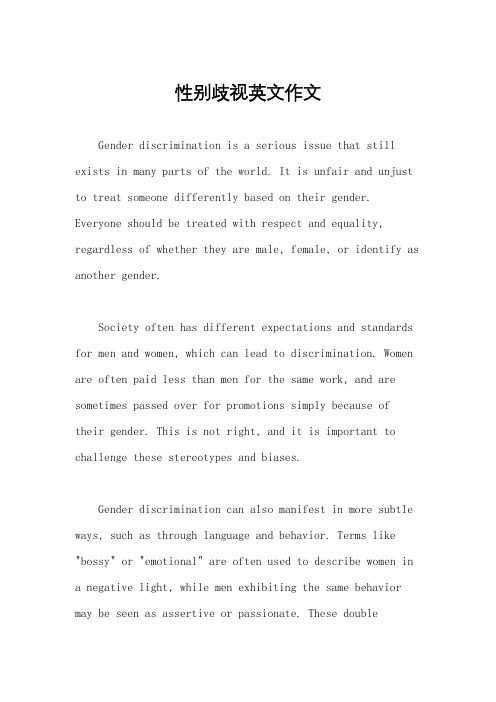
性别歧视英文作文Gender discrimination is a serious issue that still exists in many parts of the world. It is unfair and unjust to treat someone differently based on their gender. Everyone should be treated with respect and equality, regardless of whether they are male, female, or identify as another gender.Society often has different expectations and standards for men and women, which can lead to discrimination. Women are often paid less than men for the same work, and are sometimes passed over for promotions simply because oftheir gender. This is not right, and it is important to challenge these stereotypes and biases.Gender discrimination can also manifest in more subtle ways, such as through language and behavior. Terms like "bossy" or "emotional" are often used to describe women in a negative light, while men exhibiting the same behavior may be seen as assertive or passionate. These doublestandards only serve to reinforce harmful gender stereotypes.It is crucial to educate ourselves and others about the harmful effects of gender discrimination. By raising awareness and promoting gender equality, we can work towards creating a more inclusive and fair society for everyone. Discrimination based on gender has no place in our world, and it is up to each of us to stand up against it.。
性别歧视中英演讲稿
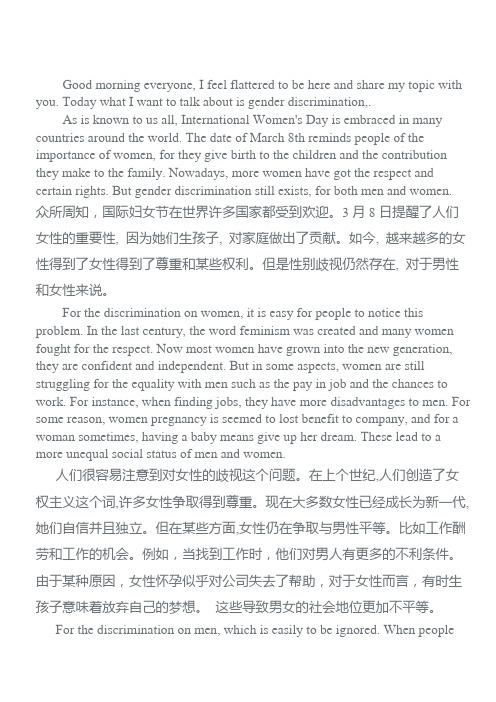
Good morning everyone, I feel flattered to be here and share my topic with you. Today what I want to talk about is gender discrimination,.As is known to us all, International Women's Day is embraced in many countries around the world. The date of March 8th reminds people of the importance of women, for they give birth to the children and the contribution they make to the family. Nowadays, more women have got the respect and certain rights. But gender discrimination still exists, for both men and women. 众所周知,国际妇女节在世界许多国家都受到欢迎。
3月8日提醒了人们女性的重要性, 因为她们生孩子, 对家庭做出了贡献。
如今, 越来越多的女性得到了女性得到了尊重和某些权利。
但是性别歧视仍然存在, 对于男性和女性来说。
For the discrimination on women, it is easy for people to notice this problem. In the last century, the word feminism was created and many women fought for the respect. Now most women have grown into the new generation, they are confident and independent. But in some aspects, women are still struggling for the equality with men such as the pay in job and the chances to work. For instance, when finding jobs, they have more disadvantages to men. For some reason, women pregnancy is seemed to lost benefit to company, and for a woman sometimes, having a baby means give up her dream. These lead to a more unequal social status of men and women.人们很容易注意到对女性的歧视这个问题。
性别不均衡英语作文
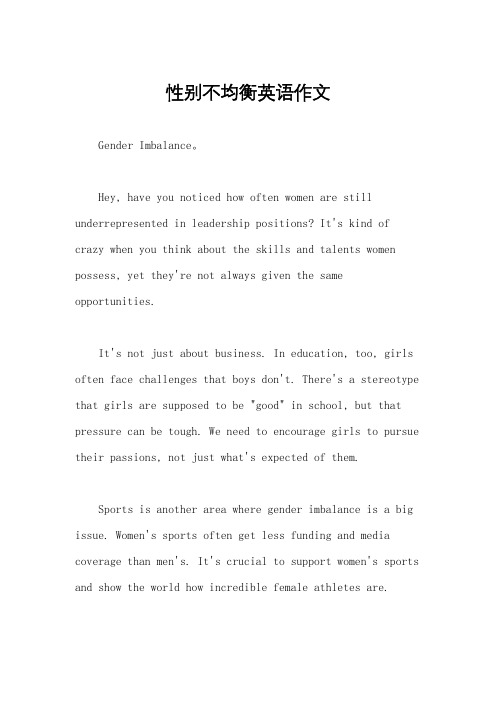
性别不均衡英语作文Gender Imbalance。
Hey, have you noticed how often women are still underrepresented in leadership positions? It's kind of crazy when you think about the skills and talents women possess, yet they're not always given the same opportunities.It's not just about business. In education, too, girls often face challenges that boys don't. There's a stereotype that girls are supposed to be "good" in school, but that pressure can be tough. We need to encourage girls to pursue their passions, not just what's expected of them.Sports is another area where gender imbalance is a big issue. Women's sports often get less funding and media coverage than men's. It's crucial to support women's sports and show the world how incredible female athletes are.Technology is rapidly advancing, but women in tech are still few and far between. We need to encourage girls to explore coding, engineering, and other STEM fields. Who knows, maybe the next big tech innovator will be a woman!In the workplace, women often face pay gaps and glass ceilings. It's unfair and needs to change. Companies should promote women and ensure they'。
关于性别歧视的英语作文
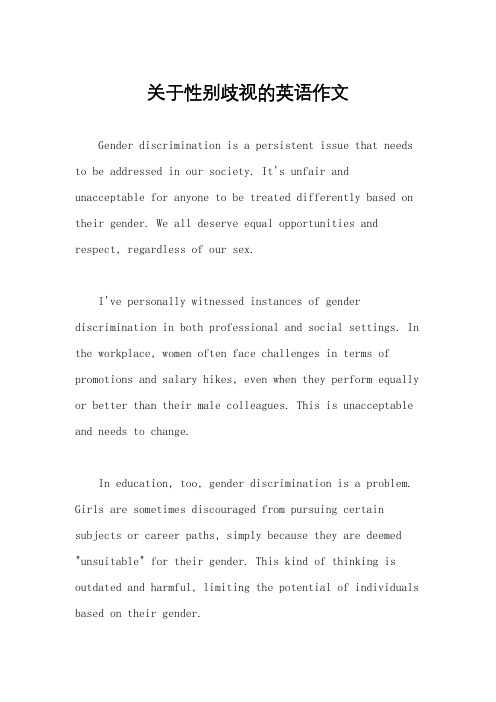
关于性别歧视的英语作文Gender discrimination is a persistent issue that needs to be addressed in our society. It's unfair and unacceptable for anyone to be treated differently based on their gender. We all deserve equal opportunities and respect, regardless of our sex.I've personally witnessed instances of gender discrimination in both professional and social settings. In the workplace, women often face challenges in terms of promotions and salary hikes, even when they perform equally or better than their male colleagues. This is unacceptable and needs to change.In education, too, gender discrimination is a problem. Girls are sometimes discouraged from pursuing certain subjects or career paths, simply because they are deemed "unsuitable" for their gender. This kind of thinking is outdated and harmful, limiting the potential of individuals based on their gender.Moreover, gender discrimination is not just about professional or educational opportunities. It's also about the way we treat each other in our daily lives. Usingsexist language or making assumptions about someone's abilities based on their gender are all forms of discrimination that we need to be aware of and combat.We must also recognize that gender discrimination isn't just a women's issue. Men can also be victims of this kind of bias, especially when it comes to expectations about their roles and responsibilities. Everyone has the right to be treated with respect and equality, regardless of their gender.In conclusion。
性别歧视 英文作文
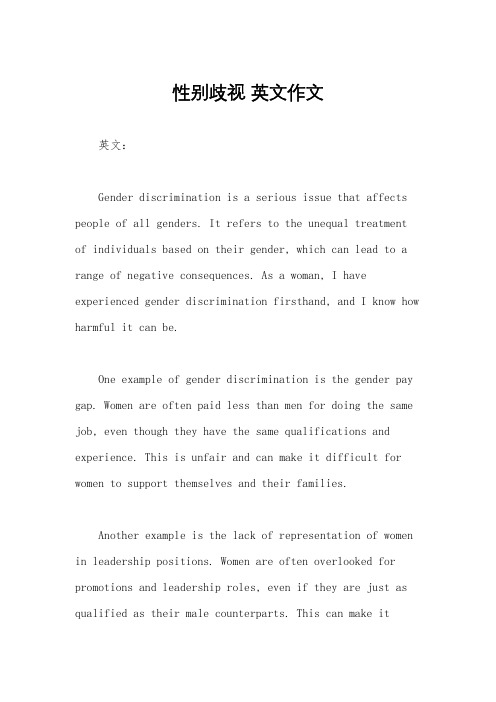
性别歧视英文作文英文:Gender discrimination is a serious issue that affects people of all genders. It refers to the unequal treatment of individuals based on their gender, which can lead to a range of negative consequences. As a woman, I have experienced gender discrimination firsthand, and I know how harmful it can be.One example of gender discrimination is the gender pay gap. Women are often paid less than men for doing the same job, even though they have the same qualifications and experience. This is unfair and can make it difficult for women to support themselves and their families.Another example is the lack of representation of women in leadership positions. Women are often overlooked for promotions and leadership roles, even if they are just as qualified as their male counterparts. This can make itdifficult for women to advance in their careers and achieve their goals.It's important to recognize that gender discrimination affects people of all genders. For example, men who work in traditionally female-dominated fields, such as nursing or teaching, may face discrimination and be seen as less competent simply because of their gender.In order to address gender discrimination, we need to raise awareness and educate people about the issue. We also need to implement policies and laws that promote gender equality and hold organizations accountable for discriminatory practices. By working together, we can create a more equal and just society for all.中文:性别歧视是一个严重的问题,影响着所有性别的人。
关于性别歧视的英语作文

关于性别歧视的英语作文英文回答:Gender discrimination is a pervasive issue that affects individuals all around the world. It is the unfair treatment or perception of individuals based on their gender, and it can manifest in various forms such as unequal pay, limited job opportunities, and societal expectations.I have personally experienced gender discrimination in the workplace. A few years ago, I was working in a male-dominated industry where I noticed that my male colleagues were often given more opportunities for career advancement and higher pay than I was. Despite having the same level of education and experience, I was consistently overlooked for promotions and raises. This made me feel undervalued and discouraged, and it was clear that my gender was a factorin the disparities I was experiencing.In addition to the workplace, gender discrimination also permeates into other aspects of life. For example, women are often held to different standards than men whenit comes to parenting and household responsibilities. I have seen how society expects women to take on the majority of the caregiving duties, while men are not held to the same expectations. This not only creates an imbalance in the division of labor but also perpetuates the idea that women are inherently better suited for domestic roles.Furthermore, gender discrimination can also have a significant impact on an individual's mental and emotional well-being. When someone is constantly subjected to unfair treatment or bias based on their gender, it can lead to feelings of inadequacy, frustration, and even depression. I have witnessed friends and colleagues struggle with the emotional toll of gender discrimination, and it is heartbreaking to see the toll it takes on their self-esteem and overall happiness.It is important to address gender discrimination and work towards creating a more equitable society for allindividuals, regardless of their gender. This can be achieved through implementing and enforcing policies that promote gender equality in the workplace, challenging societal norms and expectations, and educating others about the harmful effects of gender discrimination.中文回答:性别歧视是一个普遍存在的问题,影响着世界各地的个体。
- 1、下载文档前请自行甄别文档内容的完整性,平台不提供额外的编辑、内容补充、找答案等附加服务。
- 2、"仅部分预览"的文档,不可在线预览部分如存在完整性等问题,可反馈申请退款(可完整预览的文档不适用该条件!)。
- 3、如文档侵犯您的权益,请联系客服反馈,我们会尽快为您处理(人工客服工作时间:9:00-18:30)。
Female inferiors
Decades ago, Chairman Mao succinctly settled the age-old debate about gender equality when he stated that "woman holds up half of the sky". Male superiority so out of place in this age, when women are said to be equal to men in many aspects. However, we very grieved discovery already said goodbye to feudalism several hundred years China to be still unable get rid of the treatment of woman as inferiors thought the fetter. In this advanced society, phenomenon of female inferiors not only existing stably but also taking control of our minds and indicates in many fields. To begin with, take employment for example, women are excluded from the major department of productions. Many significant occupations such as executive or professional jobs prefer hiring male rather than woman. Moreover, man still holds perception that women should do more household routine, nurture their offspring and take care of pets. Last but not the least, people living in remote areas believed that men are superior to women, until this status does not also get thorough improvement now. When a woman got pregnant, they were begging for a son instead of a daughter.
To prevent these troublesome already mentioned from happen again, we should create feministic atmosphere, promote gender equality and ask man to do household chores, because in a family where roles of men and women are not sharply separated and where many household tasks are
shared to a certain extent, notions of male superiority are hard to maintain.。
